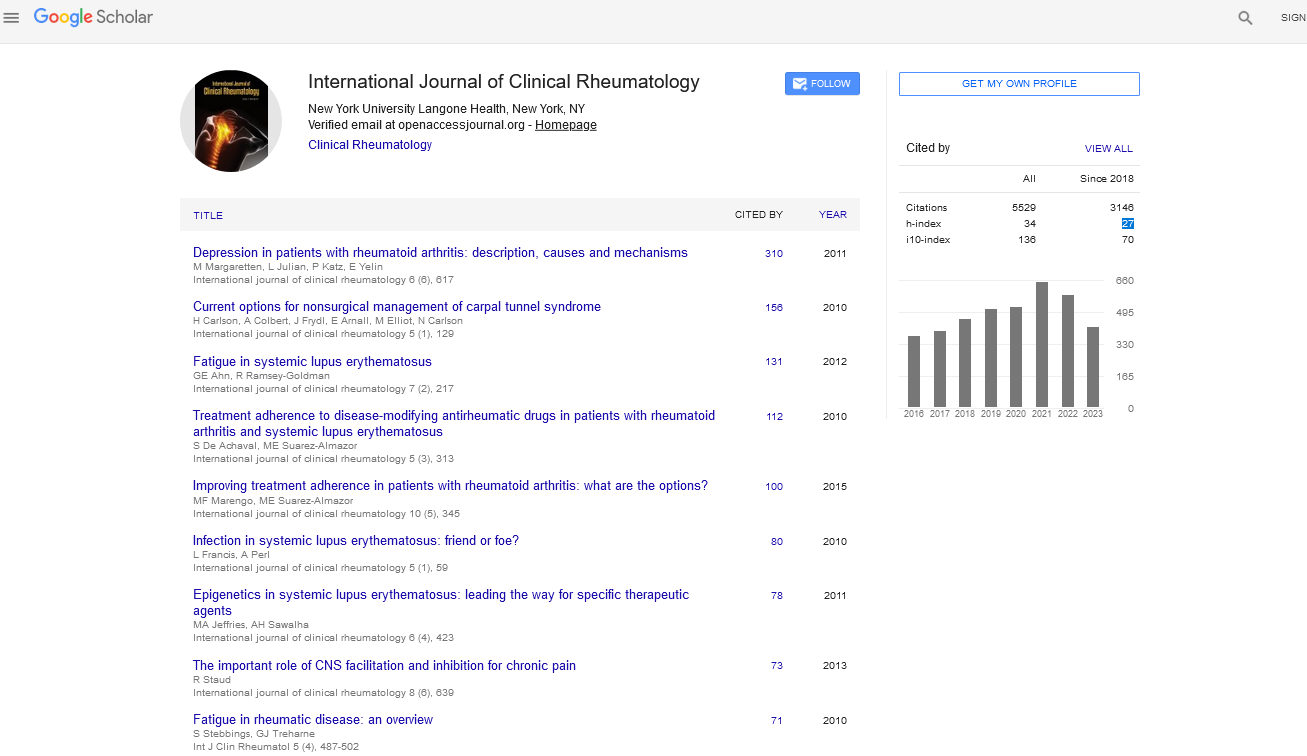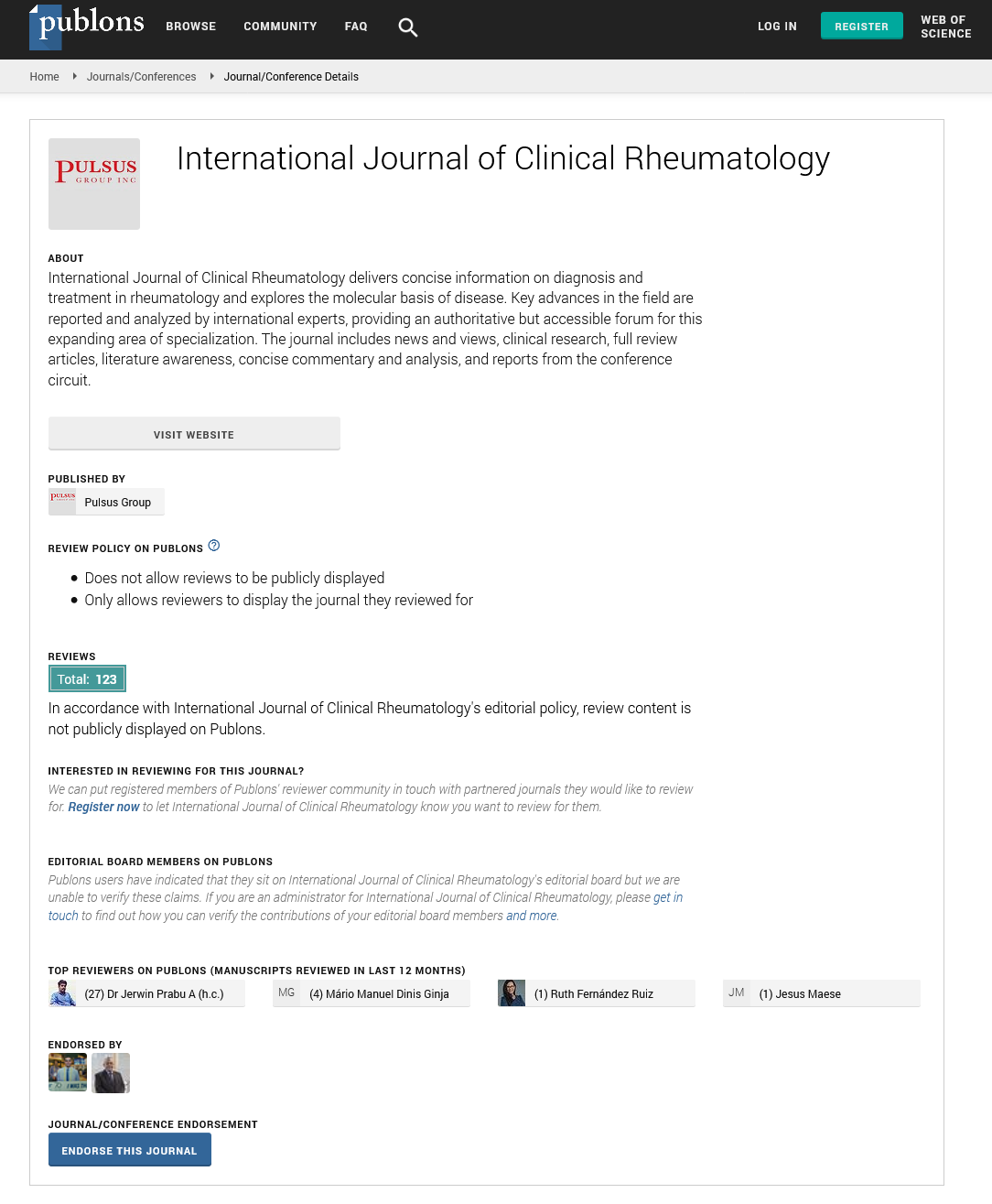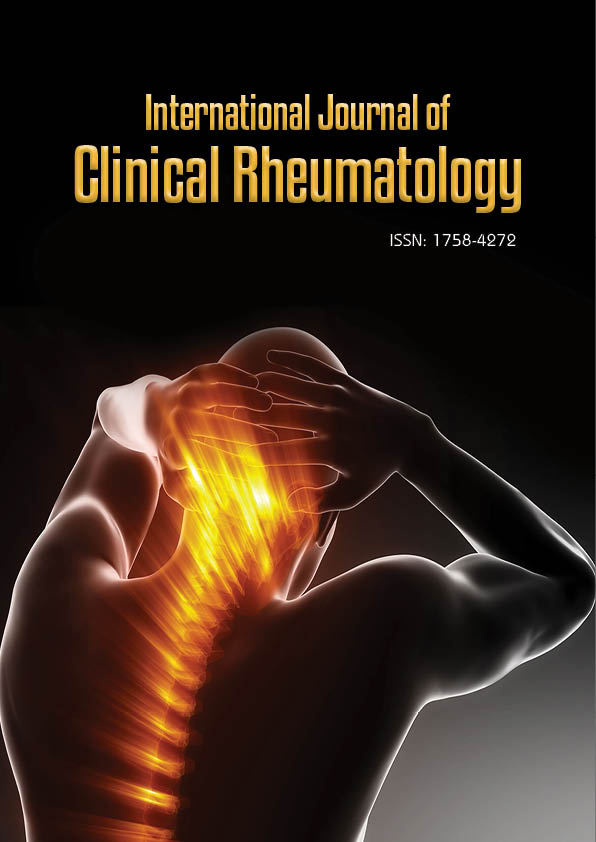Commentary - International Journal of Clinical Rheumatology (2020) Volume 15, Issue 1
Benefits and disadvantages of biologic agents in chronic inflammatory arthritis
- Corresponding Author:
- Knarik Ginosyan
Department of Rheumatology
Yerevan State Medical University, Yerevan, Armenia
E-mail: kginosyan@gmail.com
Abstract
Abbreviations
Abbreviations: EMA: European Medicines Agency; EULAR: European League Against Rheumatism; bsDMARDs: biosimilar Disease Modifying Anti Rheumatic Drug; MTX: Methotrexate; ACR: American College of Rheumatology; csDMARDs: conventional synthetic Disease Modifying Anti Rheumatic Drug; ARMADA: Anti TNF Research Study Program of the Monoclonal Antibody Adalimumab [D2E7] in Rheumatoid Arthritis; PREMIER: A Prospective Multi-Centre Randomized, Double-Blind, Active Comparator-Controlled, Parallel-Groups Study Comparing the Fully Human Monoclonal Anti- TNFα Antibody Adalimumab Given Every Second Week With Methotrexate Given Weekly and the Combination of Adalimumab and Methotrexate Administered Over 2 Years in Patients With Early Rheumatoid Arthritis; AMBITION: Actemra versus Methotrexate double Blind Investigative Trial In mONotherapy; RADIATE: RheumAtoiD ArthrItis study in Anti-TNF failurEs; LITHE: tociLizumab safety and THE prevention of structural joint damage; AIM: Abatacept in Inadequate responders to Methotrexate; ATTAIN: Abatacept Trial in Treatment of Anti-TNF Inadequate response; ATTEST: Abatacept or infliximab vs placebo, a Trial for Tolerability, Efficacy and Safety in Treating rheumatoid arthritis; DANCER: Dose Ranging Assessment- International Clinical Evaluation of Rituximab in Rheumatoid Arthritis; REFLEX: The Randomized Evaluation of Long-Term Efficacy of Rituximab in Rheumatoid Arthritis; SERENE: Study Evaluating Rituximabs’s Efficacy in Methotrexate iNadequate rEsponders; MIRROR: Methotrexate Inadequate Responders Randomized study of Rituximab; CORD: Chronic obstructive pulmonary disease; ATTRACT-Anti-TNF Therapy in RA with Concomitant Therapy; ASPIRE: Active controlled study of Patients Receiving Infliximab for the Treatment of Rheumatoid Arthritis of early onset; RAPID: Rheumatoid Arthritis Prevention of Structural Damage; FAST4WARD: EFficAcy and Safety of cerTolizumab pegol- 4 Weekly dosAge in RheumatoiD arthritis; GO-AFTER: GOlimumab After Former antitumor necrosis factor α Therapy Evaluated in Rheumatoid arthritis; GO-BEFORE: Golimumab Before Employing Methotrexate as theFirst-Line Option in the Treatment of Rheumatoid Arthritis of Early Onset; GO-FORWARD: golimumab in active rheumatoid arthritis despite methotrexate therapy; ADJUST: Adalimumab in JIA-associated Uveitis Stopping Trial; ACT-RAY: ACTemra (tocilizumab) RAdiographic study; BeSt: BEhandelings Strategies
Commentary
Chronic inflammatory arthritis (Rheumatoid Arthritis (RA), peripheral forms of seronegative spondylitis (SpA) etc.) is a group of chronic inflammatory disorder that may affect various joints. The only way to stop the progression of the disease and improve the quality of life of these patients is using of Disease Modyfing Anti Rheumatic Drugs (DMARD). The major advantage of these agents is their potential ability to stop the destruction of bones and joints. DMARDs form two major classes: synthetic (traditional) drugs (sDMARDs) as methotrexate, sulfasalazine, leflunomide and others and biological compounds (bDMARDs). In last years, there have been significant advances of therapy, especially for patients in whom traditional sDMARDs were not efficient. Nowadays, Tumour Necrosis Factor (TNF) inhibitors, such as infliximab, adalimumab, golimumab and others, the T cell co-stimulation inhibitor, abatacept, the anti-B cell agent, rituximab, and several anti-interleukin agents (IL-6, IL-1, IL-17, IL-12/23) are available [1].
Biologics are mainly used in patients who have miscarried synthetic DMARDs due to inefficacy or toxicity. As it is said in EULAR recommendations for the management of rheumatoid arthritis, «in patients responding insufficiently to MTX and/or other csDMARD strategies, with or without glucocorticoids, bDMARDs (TNF inhibitors, abatacept or tocilizumab, and, under certain circumstances, rituximab) should be commenced with MTX» [2]. The positive effect of biological DMARDs had been proven in many randomized doubleblind controlled studies. In some of them biological DMARDs had shown superiority to methotrexate [3].
In particular, combination of infliximab and MTX shows effectiveness at the ACR20 level around 60% of recipients within 8-12 weeks, with less patients achieving ACR50 and ACR70. The ATTRACT study had shown that combination of MTX and infliximab is much more efficacious compared to combination of MTX with placebo according to clinical and radiographic indices. Several recent studies (ASPIRE, BeSt etc.) indicate that infliximab may exhibit better efficacy if used in earlier disease.
Several randomized controlled studies support the use of adalimumab in RA, and indicate that it is superior to placebo in controlling signs and symptoms and in progressive erosive disease. In ARMADA study adalimumab/MTX was shown to be superior to placebo/MTX in terms of ACR responses and erosive progression. The PREMIER study compared adalimumab/ MTX combination with MTX alone and with adalimumab alone. The combination was significantly better than either agent used alone [4].
Certolizumab exhibited superiority to placebo in patients who were MTX incomplete responders in two phase III studies (RAPID1 and RAPID2). In both studies, at week 24, a significantely higher number of recipients of certolizumab, achieved ACR20 in comparison to placebo. Clinical benefits were noted 1 week after therapy, achieved their maximum at weeks 16-20 and were maintained through weeks 52 (RAPID1) and 24 (RAPID2). Similarly, 400 mg of certolizumab administered monthly as monotherapy in DMARD failures (FAST4WARD) is clinically efficatious, although with lower rates of patients achieving ACR 20/50/70 as compared to those receiving regimens in association with MTX.
Three trials proved the superiority of golimumab in MTX naive (GO-BEFORE), MTX inadequate responder (GO-FORWARD) and anti-TNF-failure (GO-AFTER) RA patients. Some RCTs provide effectiveness of etanercept, a bivalent TNF-binding agent, in RA. Etanercept reduced clinical signs, improved DAS28, SF- 36 and other indices and reduced radiographic progression.
Several lines of evidence have supported the role of IL-6 in RA pathogenesis and encouraged the development of tocilizumab, the first humanized monoclonal antibody that inhibits IL-6 receptor. The properties (safety and efficacy) of tocilizumab has been assessed in several controlled clinical trials and ibclided more than 4000 RA patients.
The AMBITION study had shown prevalence of tocilizumab monotherapy versus MTX (70% vs 53%). Combination of tocilizumab with MTX was effective in MTX inadequate responders in comparison with placebo in the OPTION study (59% vs 26%). The RADIATE trial demonstrated that 50% of the patient’s refractory to anti-TNFtherapy achieved an ACR 20 response when treat with tocilizumab, as compared to 10% in placebo arm. Finally, protection from structural damage was evaluated in the LITHE trial at 52 weeks, which showed inhibition of radiographic progression. Moreover, tocilizumab monotherapy also demonstrated similar efficacy to tozilizumab combination with other DMARDs (ACT-RAY), in DMARD or TNF-inhibitor inadequate responses (ACT-SURE).
Several trials (AIM, ATTAIN, ATTEST, ADJUST) had demonstrated superiority of abatacept (anti-T-cell agent) against placebo in RA in spite of previous treatment with synthetic or other biologic DMARDs.
Rituximab is an antagonist of CD20 receptors of B-lymphocytes. The rational for the use of this agent in autoimmune diseases is based on its potential ability to reduce autoreactive antibody synthesis and other functions of lymphocytes. The efficacy of rituximab had been proven in several trials (DANCER, REFLEX, SERENE, MIRROR), which mainly included MTX refractory patients and/or patients, who failed other biologics. All mentioned trials, despite different study design, confirmed that treatment with rituximab was associated with maintanance or improvement of ACR responses and increase in number of MTX inadequate responders achieving low disease activity [5].
As any drug, biologics also have side effects. They can be as allergic reactions: breathlessness, hyperemia, rash, itchiness and itchy eyes. Central nervous and cardiovascular systems involvement as well as vision problems can occur less frequent. Lupus-like syndrome may also occur, which is caused by cell lysis and massive release of cell DNA. The latter predisposes to synthesis of autoantibodies against several components of cell nuclei. This effect had been especially demonstrated in infliximab [6].
All biologics suppress the immune system and increase the risk of infections. People who take biologics are more likely to get common infections such as upper respiratory infections, pneumonia, urinary tract infections, and skin infections and opportunistic infections: include hepatitis B, tuberculosis (TB), and fungal infections such as histoplasmosis. According to results of clinical studies certolizumab pegol demonstrated a higher prevalence of serious adverse effects compared with abatacept, adalimumab, etanercept, golimumab and rituximab. Rituximab had shown less ability to cause serious infections compared to anakinra. No statistically significant differences were noted between biologics in total adverse events. The most common cause of mortality with use of biologics still remain infections and septicemia [7,8].
Biologic therapy is frequently associated with mycobacterial infections (tuberculosis and histoplasmosis) and other opportunistic infections such as listeriosis, nocardiosis, invasive aspergillosis and others. These drugs may potentially cause serious infective complications de novo, as well as reactivate latent infections, especially tuberculosis, Herpes Simplex Virus, hepatitis C and hepatitis B virus (HBV) infections. The property of TNF-α agents to reactivate HBV has been well-described in several studies. The proven role of rituximab to reactivate HBV infection in hematological patients was also described RA patients. Nevertheless, observational data on this topic for abatacept and tocilizumab are still lacking, with only a few reports [7,8].
TNF-α antagonists seem extremely prominent for increasing the risks of TB infection and reactivation of Latent Tuberculosis Infection (LTBI). According to large number of clinical trials tocilizumab, rituximab and abatacept are associated with very low or absent risk of TB reactivation, so the screening procedures for LTBI before therapy starting seem unnecessary [9,10].
The most emerging concerns with long-term use of biologics are related to development of cancer. There is a common opinion that cytokines such as TNF have a prominent role in suppression of cancer development. Initially it had been shown in early infliximab studies and some case reports. It especially concerned sudden occurrence of lymphomas and intestinal adenocarcinomas. Large US observational studies reported the association of biologic therapy with increased risk for skin cancers [11].
Conclusion
These drugs had made a revolution in the treatment of inflammatory rheumatic disorders resulting in stop or reducing of the disease progression. Nevertheless, serious infections such as reactivation of LTBI and HBV, risk of malignancy and cancer remain the main problem of biologic therapy.
References
- Smolen JS, van der Heijde D, Machold KP et al. Proposal for a new nomenclature of disease-modifying anti-rheumatic drugs. Ann. Rheum. Dis. 73(1), 3–5 (2014).
- Nam JL, Ramiro S, Gaujoux-Viala C et al. Efficacy of biological disease-modifying antirheumatic drugs: a systematic literature review informing the 2013 update of the EULAR recommendations for the management of rheumatoid arthritis. Ann. Rheum. Dis. 73(3), 516–528 (2014).
- Smolen JS, Landewé R, Bijlsma J et al. EULAR recommendations for the management of rheumatoid arthritis with synthetic and biological disease-modifying antirheumatic drugs: 2016 update. Ann. Rheum. Dis. 76(6), 960–977 (2016).
- Nam JL, Winthrop KL, van Vollenhoven RF et al. Current evidence for the management of rheumatoid arthritis with biological disease-modifying antirheumatic drugs: A systematic literature review informing the EULAR recommendations for the management of RA. Ann. Rheum. Dis. 69(6), 976−986 (2010).
- Gaujoux-Viala C, Gossec L, Cantagrel A et al. Recommendations of the French Society for Rheumatology for managing rheumatoid arthritis. Joint. Bone. Spine. 81(4), 287–297 (2014).
- Singh JA, Wells GA, Christensen R et al. Adverse effects of biologics: a network meta‐analysis and Cochrane overview. Cochrane. DB. Syst. Rev. (2011).
- Minozzi S, Bonovas S, Lytras T et al. Risk of infections using anti-TNF agents in rheumatoid arthritis, psoriatic arthritis, and ankylosing spondylitis: a systematic review and meta-analysis. Expert. Opin. Drug. Saf. 15(Suppl 1), 11–34 (2016).
- Nard FD, Todoerti M, Grosso V et al. Risk of hepatitis B virus reactivation in rheumatoid arthritis patients undergoing biologic treatment: Extending perspective from old to newer drugs. World. J. Hepatol. 7(3), 344–361 (2015).
- Souto A, Maneiro J, Salgado E et al. Risk of tuberculosis in patients with chronic immune-mediated inflammatory diseases treated with biologics and tofacitinib: a systematic review and meta-analysis of randomized controlled trials and long-term extension studies. Rheumatology (Oxford). 53(10), 1872–1885 (2014).
- Cantini F, Nannini C, Niccoli L et al. Risk of tuberculosis reactivation in patients with rheumatoid arthritis, ankylosing Spondylitis, and psoriatic arthritis receiving non-anti-TNF-targeted biologics. Mediators. Inflamm. 2017, 1–15 (2017).
- Wolfe F, Michaud K. Biologic treatment of rheumatoid arthritis and the risk of malignancy: Analyses from a Large US observational study. Arthritis. Rheum. 56(9), 2886–2895 (2007).


